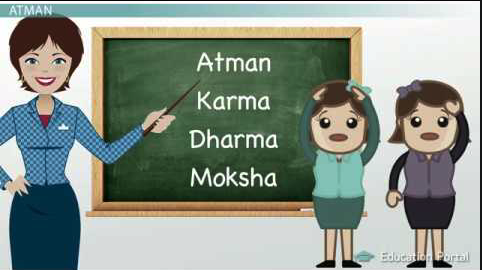Simple answers to your questions on Hinduism are provided here.
Use the search button (top right on desktop, top left on smartphones) to find specific topics of interest. At the bottom of each answer, check the “Tags” section for related topics. To learn more about this Q&A project, click [here].

On Hinduism
You can also download an earlier collection: 300QAs on Hinduism (PDF). Thank you.

14. Afterlife
Rest in Peace (RIP) is an Abrahamic concept, as per which the body waits or rests in a grave. On Judgement Day, the body gets united with the soul and rises again. God will make judgement for who will go to heaven or eternal hell.
Hindus believe in reincarnation of the departed soul to a new body and soul does not rest. Hindus have a concept that if the soul is trapped inside the earth, then it’s called as a Preta (a disturbed soul and in suffering). Suffering in Hell is better as it’s temporary, but not getting trapped here. Thus to tell RIP is a disrespect to the departed Hindu.
“Param Gati Mile” (may the soul attain moksha), “Om Sadagati” and “Om Shanti” are appropriate expressions when a Hindu passes away.
Other reading material: Here is why saying ‘Rest in Peace’ is a disservice to the departed Hindu soul,
Relevant videos:
Contributor: Dilip Amin
Location of this post (14a): https://www.hinduspeakers.org/ufaqs/is-rip-an-appropriate-expression-for-a-departed-hindu/
Death is inevitable and deterministic (uncontrollable) according to the Hindu religion.
Death does not imply the cessation of our existence, but it means a new beginning. Death is just a small milestone on the journey of infinite miles of eternal existence. Thus the phenomena of death is linked to the concept of rebirth.
Hinduism has a deep rooted belief in the theory of rebirth; the idea of rebirth is connected to the idea of the ‘Atman’ or the Soul, the individual’s non-material inner self that is eternal. The Atman cannot be experienced with the five sense organs but it does exist as a spiritual substance. When a human dies, the Atman from his body detaches itself from the literal body and moves out in search of another body and there occurs rebirth.
How does the Atman decide what it wants to be reborn again as? This question takes us to one of the most basic philosophical theories of Hinduism; the concept of Karma. Karma is the accumulated past actions waiting to come to fruition. One’s rebirth depends on past actions (Karma), good deeds taking you towards better births and immoral deeds taking you towards birth in lower category creatures like animals.
Thus Hinduism gives a highly positive interpretation to the concept of death and the journey beyond this life. We will always live in the form of an Atman and death is a milestone on the journey of the Atman.
In Bhagavad Gita, Supreme GOD Sree Krishna says to Arjun (Chapter 2, Sloka 22):
vāsānsi jīrṇāni yathā vihāya
navāni gṛihṇāti naro ’parāṇi
tathā śharīrāṇi vihāya jīrṇānya
nyāni sanyāti navāni dehī
As a person sheds worn-out garments and wears new ones, likewise, at the time of death, the soul casts off its worn-out body and enters a new one.
Other reading material:
Relevant videos: Swami Nikhil Anand What happens when we die?, What is Reincarnation?,
Contributor: Mona Raval
Location of this post (14b): https://www.hinduspeakers.org/ufaqs/what-happens-when-we-die/
According to Hinduism, Yes!
Hinduism is deeply rooted in the concept of Karma and reincarnation. Destiny is defined as a predetermined course of events (in general or in an individual’s life) as planned by Divine will. Hindus believe that such a predetermined course is created by an individual through his or her actions or “karma” in one’s present life or past lives; as choosing good karma produces good effects on the actor, while choosing the bad karma produces bad effects in present or future lives.
Destiny therefore is the result of the past exercise of the actor’s choice. By choosing the actions in the past, an individual brings on the resultant destiny in this life. Similarly, by choosing good actions in the present, one can change the course of present life and in future reincarnations.
.
Sri Aurobindo, wrote (Dec 16, 1936): “We ourselves are our own fate through our actions, but the fate created by us binds us; for what we have sown, we must reap in this life or another. Still we are creating our fate for the future even while undergoing old fate from the past in the present. That gives a meaning to our will and action…”.
In Mahabharata, destiny and karma are explained with examples of seeds: “Without seeds, fruits do not grow. Good seeds when sown yield good fruits. Bad seeds when sown yield weeds and bad fruits. If no seeds are sown, there are no fruits. Without exertion in this life, destiny is meaningless. One’s exertion now is like a tilled soil; the seeds are like destiny. The union of tilled soil and seeds, that is one’s present effort and destiny inside the seed, produces the harvest.
He who exerts with initiative is his own best friend, he who relies solely on destiny is his own worst enemy.” [Sri Aurobindo and the Mother, The Hidden Forces of Life, Ch. 1 Life Through the Eyes of the Yogin, pp.13-14].
.
Other reading material:
Relevant videos: Swami Nikhil Anand Hinduism Q & A: Can Destiny be Changed
Contributor: Ashis Khan
Location of this post (14c): https://www.hinduspeakers.org/ufaqs/can-destiny-be-changed/
